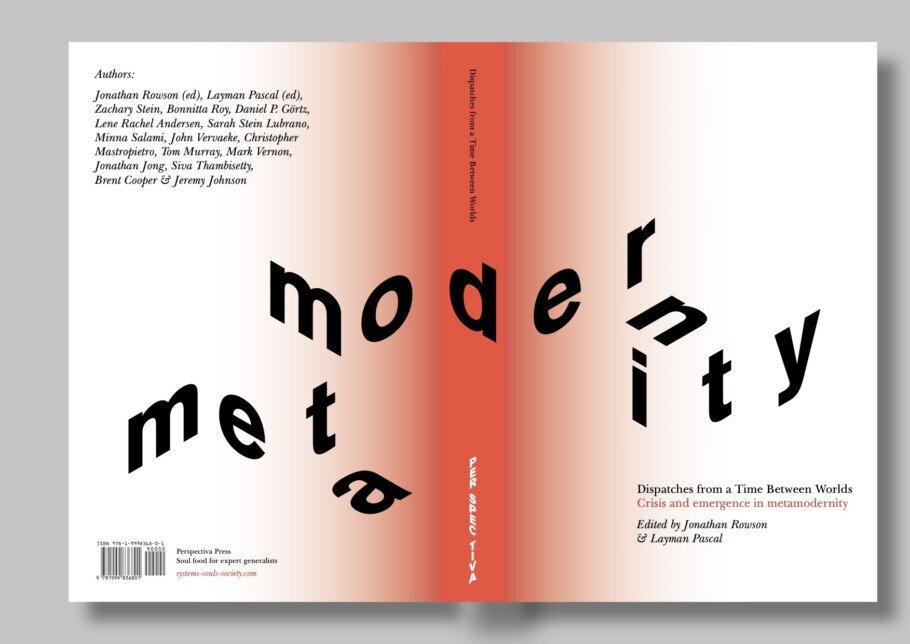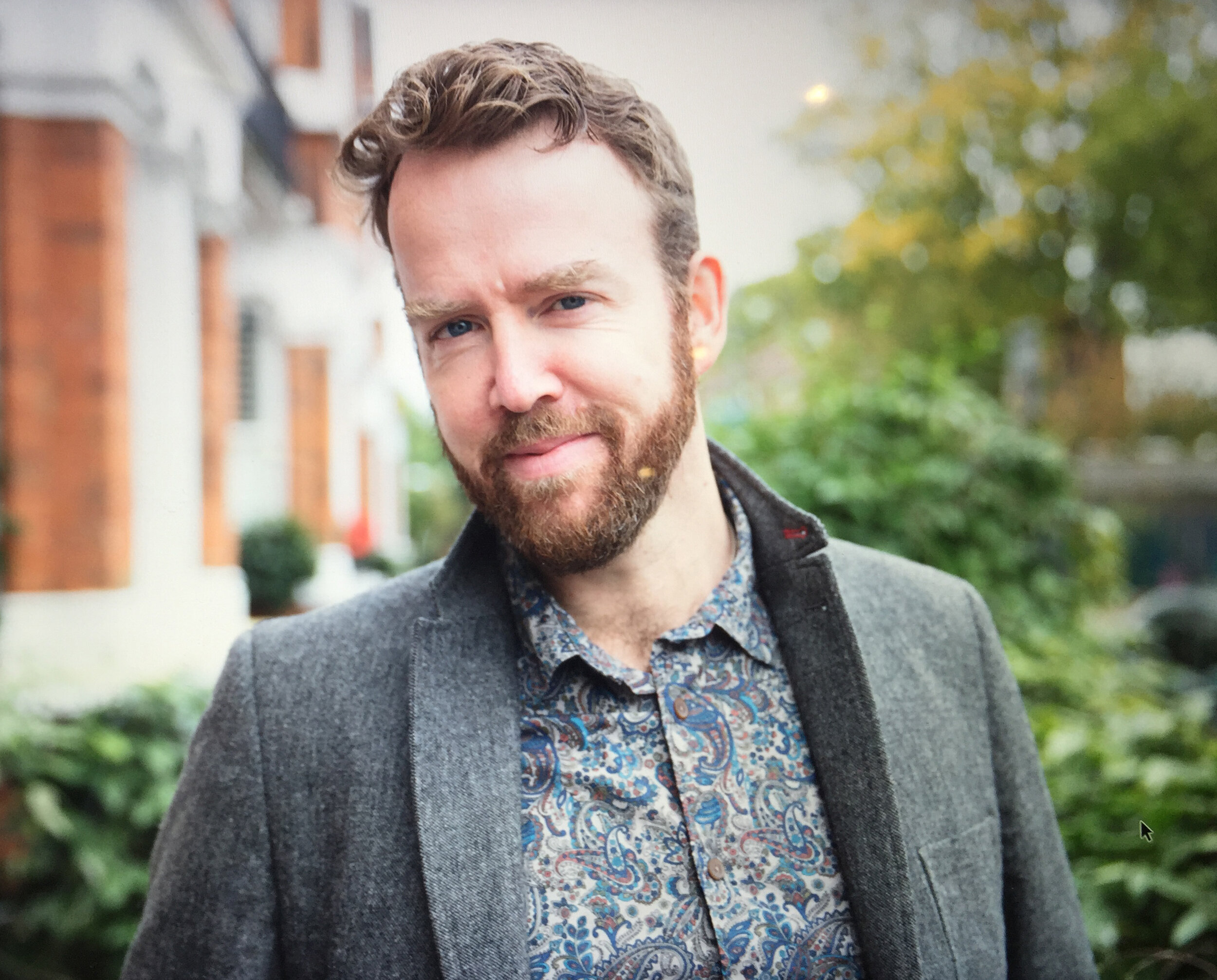We’re caught between “hope & despair, credulity & incredulity, progress & peril, agency & apathy.” Jonathan Rowson on how metamodernism can help
This is the second of our guest editorials from the authors of Perspectiva Press, the new publishing arm of our kindred organisation, the “soul-tank” Perspectiva.
Co-initiator of The Alternative UK Indra Adnan has worked out her Perspectiva book The Politics of Waking Up through these pages, and a few weeks ago we ran an essay from Anthea Lawson, author of The Entangled Activist.
This week we’re adapting (from an Emerge post, with grateful acknowledgment) a piece from Jonathan Lawson, director of Perspectiva and co-editor of the PPress collection, Dispatches from a Time Between Worlds: Crisis and Emergence in metamodernity (with Layman Pascal).
The piece both provides context for the Press as a whole, and a focus on why “metamodernism” is a useful framework for addressing our epochal crises of nature, technology and society.
Jonathan Rowson: Metamodernism doesn’t just generate mixed feelings - it’s about mixed feelings
“Give me a place to stand and a lever long enough”, said Archimedes, “and I will move the world”. This widely quoted line from Antiquity remains evocative today because the quest to ground our agency in axioms goes on. We all prefer to know what we are doing and why, but it’s not easy to find a stable vantage point.
The world is the same size as it was back then 2300 years ago, but it has become both bigger and smaller. It’s bigger because we are about eight billion people and influences on our daily experience stem from far beyond the location of our bodies.
And yet it’s smaller because we now know our planet as a dot in the vast reaches of space and we can traverse that dot on a plane in just over a day.
In this big and small world, wicked problems at scale like COVID-19 and Climate collapse can feel unreasonably confounding because they are at once remote and intimate.
The sense that many of the things that shape our lives are outside of our control is not new, but it is all the more vexing in the information age for being tantalisingly just beyond what and how we know.
As events unfold, many have become acutely aware of the relationship between, for instance, ecology, economy and epidemiology, because those relationships directly impact our lives.
Should I realise my dream of living in a house by the sea when Scientists suggest the coastal village may not be intact in 2050? What if lockdown ends too late for my business and too early for my neighbour’s health?
The challenge is not that such conundrums are merely complex, but that they are often essentially contested or sometimes even beyond intellectual comprehension, regardless of whether experts are involved.
This context is one reason we have described the offer of Perspectiva Press as ‘soul food for expert generalists’. The idea of an expert generalist is a paradox, but not an oxymoron. In theory, our very best philosophers, civil servants, political leaders, and writers are expert generalists.
Their defining skill is inclusive synthesis and their defining qualities are epistemic acumen and agility. They blend knowhow with knowledge, having enough expertise in one domain to value different forms of understanding. And they know how to integrate these forms, while retaining curiosity towards whatever remains unfamiliar.
Such soul food is called for because we seek to recapture and reenchant the discourse about what it means to be human in this moment when we expect too much of our minds, and in an era where life is increasingly shaped by technological forces beyond our control.
Perspectiva Press will therefore specialise in books that help to:
Create a community of expert generalists with skills of synthesis and epistemic agility
Envisage a world beyond consumerism, and pathways for how we might get there
Support sociological imagination in a dynamic ecological and technological context
Cultivate spiritual sensibility; clarifying how it manifests and why it matters
Encourage a more complex and systemic understanding of the world
Commit to going beyond critique, by developing vision and method
Indicate how we can do pluralism better; epistemic, cultural, political, spiritual
Clarify what it means to become the change we want to see in the world
What is Metamodernism? It’s the perception of context (and what follows)
Our confounding context is also why one of our first books is an anthology on metamodernism. Metamodernism is a theoretical perspective on our culture writ large and what to do about it, and is described by me in the book’s preface as ‘the perception of context’.
Attending to our perception of context matters acutely for many reasons, not least to think more productively. As Elon Musk put it recently: “Fear is not the mind-killer. Context-switching is the mind-killer.”
One antidote to context-switching is to see connections between contexts more clearly. This involves investing time in grasping our larger context as clearly as possible, which is what our new anthology tries to do. I recently described this attempt as follows:
I believe the point of invoking metamodernity is not to insist on this name for a chronological phase of time but to resolve to characterise a cultural epoch with a Kairological quality of time.
What this approach discloses is not just that it’s simply the early 21st century but that it’s in some meaningful sense the time, more precisely perhaps our time, to look within, between and beyond.
It is time to reappraise our inner lives and relationships by grappling with the apparent spiritual and material exhaustion of what has passed as normal and normative for a little too long: the presumed progress of science, reason, bureaucracy and industrial capitalism, the limitations of perspective and the failure of critique.
We are now obliged to create meaning and fashion agency within the context of meta-crises of perception and understanding relating to ecological, social and institutional breakdown. One world seems to be dying, and another is trying to be born...
To be metamodern is to be caught up in the co-arising of great polarities. Hope and despair, credulity and incredulity, progress and peril, agency and apathy, life and death. I had mixed feelings about metamodernism - until I realised it is about mixed feelings.
More here. These mixed feelings stem from our increasing emotional sensitivity to the dynamics of our world systems. This is not just of theoretical importance. It directly shapes our awareness of the breakdown between cause and effect - a breakdown our increasingly shaky political mandates must disavow.
Politicians like to show efficacy through the levers they pull. But in an interconnected world of multiple state and commercial actors, ‘pulling a lever’ - for instance through monetary policy or by going to war - is more likely than not to create unintended and undesirable consequences.
This breakdown in the relationship between cause and effect and the difficulty in connecting how we understand the world with how we act in it means we have to work harder to find our ‘place to stand’.
In this algorithmic society, our attention is distracted by design, our viewpoints polarised on purpose. Political hope nowadays lies in speaking truth to power from a place that confers legitimacy and authority. That means forging our own sense of truth and power - one that is undeceived about what truth and power mean in a digitally meditated world.
***
More from the original Emerge post here. And click here to buy Dispatches From A Time Between Worlds


